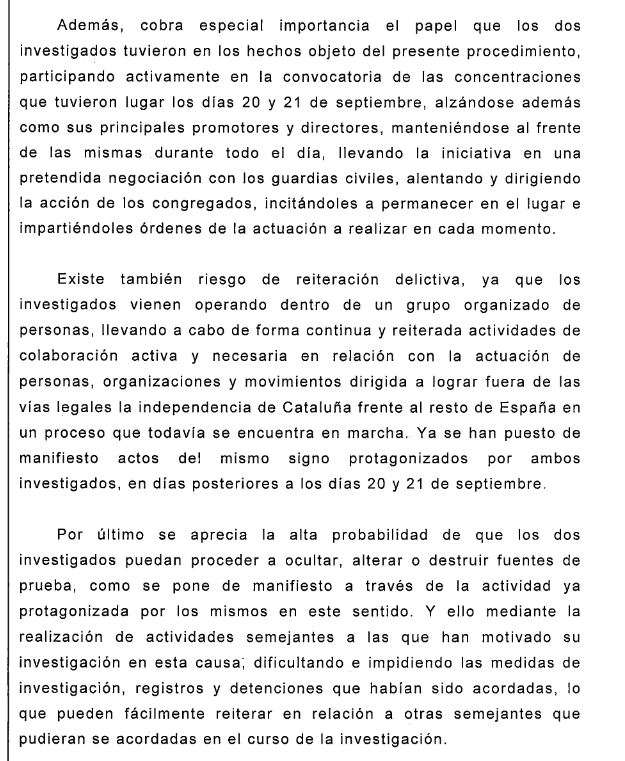They blocked nothing. They promoted mobilizations to show our position against the police actions, many of them without the judge order, like they tried with CUP. They even asked manifestants to open a way for the police inside the buildings to leave without problems.
But they are being charged by sedition....
Is a peaceful manifestation illegal?
If you had read the court order you would have noticed that the court order refers to events previous to the referendum and the police charges. The dates August 28th (setting up the means to coordinate mobs to prevent court orders from being applied) and September 25th (surrounding Guardia Urbana officers and removing police evidence from their car) are explicitly pointed out.
The referendum took place the 1st of October. So after the incidents named in the court order.
It's up to Spain to allow it.
https://twitter.com/arsenioescolar/status/918544241206480897
Separación de poderes mis cojones
Taking the temperature of a judge and making educated guesses to coordinate strategy is basically the oldest thing in the law business. Expecting a remand for Cuixart and Sanchez while putting Trapero's on doubt is nothing extraordinary. The prosecutor's office probably counted on that since the start. As a matter of fact, it was widely predicted by legal experts as I pointed out in my previous message.
As for the separation of powers quip, I find that rich considering that Puigdemont's letter
literally asked Rajoy to step in and block the judiciary by reverting the investigations. That's not only illegal, but far outside of the presidential powers. There's literally no legal mechanism to do it, and that's actually a good thing despite the many shortcomings of the Spanish legal system. At best, he could mess with the prosecutor and initiate a brand new constitutional crisis because the situation is not critical as it is.
Meanwhile, Puigdemont's disconnection laws explicitly stated that the president of the Higher Catalonian Court of Justice would be named by the Catalonian president upon the recommendation of five aides chiefly named by the new Catalonian government. It also estates that any court case being processed elsewhere would have to be reopened and started again in Catalonia, under a new judiciary that prioritized judges currently serving the Catalonian judiciary and forced those working for the State tribunals to reapply. This essentially means a blank slate that nukes away the many corruption cases in which members of the CiU coalition are indicted.
That absolutely insane legal framework is what the Catalonian government was meant to enact per their (suspended) mandate upon wining the referendum. That is literally what the separatist side voted on when they slipped the yes vote in. Articles 66.4, 68.1 and 68.4 of the Law of juridical transition and foundation of the Republic. And since I don't feel like being labeled an slanderous unionist, here's the full text at
ElNacional.cat
Basically, people who voted yes have no leg to stand when it comes to criticising the Spanish judiciary. They basically agreed to create a new state with the explicit commitment to prevent the separation of powers.
This law gets brushed away because it's a ponderous issue that doesn't fill covers like a simpler story such as the referendum, but that's the issue at play: the Catalonian government issuing their own, wildly illegal laws with no apparent intention to back off. Way more than a flawed referendum with no real international support, the Law of juridical transition and foundation of the Republic is what's driving the Spanish judiciary and Rajoy's government.
Rajoy is a horrible person and a terrible politician, but the judiciary is not acting out of a festive mood here. Now we can debate if the remand is/is not harsh given the way the Spanish justice operates (which is to say that it prioritises letting people walk away during a case), but the legal principle is pretty clear and the judge names various evidence that points towards the leaders of the ANC and Omnium showing their reiterated contempt to the courts. We'll probably know a lot more when those intercepted communications and documents are released.

